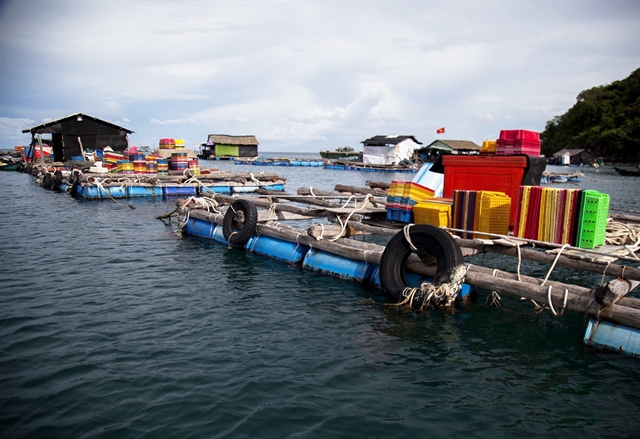
KIÊN GIANG – The Cửu Long (Mekong) Delta province of Kiên Giang is seeking to make its marine aquaculture safe and sustainable and economically efficient, according to its Department of Agriculture and Rural Development.
The province, which has the largest number of floating aquaculture cages in the delta, plans to breed marine fish in 3,890 cages this year and attain an output of 3,535 tonnes.
It also aims to breed bivalve mollusks like blood cockles, green mussels and ark clams on 23,950ha, and pearl oysters on 100ha with a harvest of around 70,000 pearls.
With its coastline of more than 200km and 143 large and small islands, it enjoys a big advantage.
The province wants major marine aquaculture communes like Lại Sơn in Kiên Hải District, Tiên Hải in Hà Tiên City and Gành Dầu in Phú Quốc City to complete reorganisation of their marine aquaculture this year.
At least 50 per cent of households breeding marine fish in these places will be allocated sea areas for aquaculture and will grant identified codes for their floating cages.
Other communes like Sơn Hải in Kiên Lương District, Thổ Châu in Phú Quốc and An Sơn and Nam Du in Kiên Hải will zone concentrated aquaculture areas and create linkages between various stakeholders in production and consumption.
Quảng Trọng Thao, deputy director of the province Department of Agriculture and Rural Development, said farmers would be helped with getting soft loans to resume production after a long and difficult period because of COVID.
The province would also help them switch from traditional methods and breeding fish near shore to industrial methods and offshore to increase value, he said.
The focus would be on high-value species and using new materials like high-density polyethylene and durable nets for making floating cages to better resist winds and waves.
The province would set up automatic water monitoring stations in concentrated marine aquaculture areas to provide data about water quality to farmers. They would have early warnings about pollution and unusual water quality for farmers to take proactive measures to mitigate them.
The province would help farmers set up co-operatives and co-operative groups and help them improve their efficiency.
It would help create linkages between production and consumption stakeholders in marine aquaculture and build brand names for produce.
Cultivation expansion
Farmers in the province are breeding various kinds of fish like cobia, grouper and yellow pomfret and other aquatic species like lobsters, blue swimmer crabs, pearl oysters, green mussels, ark clams, and blood cockles.
In Phú Quốc City’s Thổ Châu Commune, farmers are expanding marine fish farming in cages.
Trịnh Minh Khanh breeds cobia in eight cages in Thổ Châu and expects to earn VNĐ400 – 500 million (US$17,400 -21,800) when he harvests soon. The price of the fish has increased to VNĐ140,000 ($6.1) a kilogramme now.
Cobia farmers faced great difficulty in the last two years because of COVID but did not suffer much loss because the feed is cheap trash fish, he said.
Demand for marine fish had increased now and so selling them would be easier, he said.
“If marine fish farmers are hardworking and prices are reasonable, they will have a good income.”
In coastal An Biên and An Minh districts, farmers are expanding the farming of blood cockles in mud flats, mangrove forests and shrimp ponds.
An Biên farmed blood cockles on 5,100ha last year and produced 16,000 tonnes while An Minh had 1,400ha and an output of 1,567 tonnes.
Farmers here have bred the mollusk for many years and enjoyed steady incomes.
Nguyễn Hoàng Lương, who breeds them in a 3ha mangrove forest in An Minh’s Tân Thạnh Commune, said farmers could harvest 2 – 2.5 tonnes of blood cockles per hectare a year and sell them at VNĐ100,000 ($4.3) a kilogramme.
“After deducting costs, I earn more than VNĐ300 million ($13,000) a year.”
Trang Minh Tú, head of the An Biên Bureau of Agriculture and Rural Development, said the district was reviewing blood cockle farming to make zoning plans and develop eco-tourism.
The province exported more than $250 million of seafood products last year. – VnExpress News
- Reduce Hair Loss with PURA D’OR Gold Label Shampoo
- Castor Oil Has Made a “Huge” Difference With Hair and Brow Growth
- Excessive hair loss in men: Signs of illness that cannot be subjective
- Dịch Vụ SEO Website ở Los Angeles, CA: đưa trang web doanh nghiệp bạn lên top Google
- Nails Salon Sierra Madre
 VnExpress News The News Gateway of Vietnam
VnExpress News The News Gateway of Vietnam





